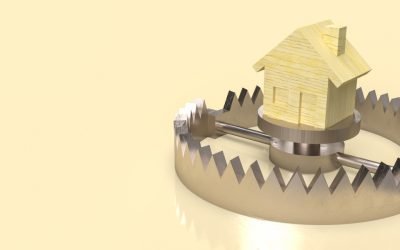Buying property at auction is a great way to access properties that may not be available on the open market. Whether you’re looking for your dream home, an investment property, or a project to flip for a profit, plenty of options are available. But if you’re new to the process, it can be a little intimidating, so how do you buy property at auction?
To buy property at auction in the UK, you’ll need to research and prepare for the process ahead of time. Most auctioneers put out lists of properties going up for auction online. You will need documents like proof of identity and proof of address to register in advance.
As an investor looking for a great deal, buying property at auction can be the perfect way to get your hands on a bargain. While it can be daunting, the process is surprisingly straightforward. Here’s a quick guide on how to buy property at auction in the UK:

1. Do Your Research
Find an area where you would like to buy a property and contact the local estate agent. Ask them to email you a list of properties that are up for auction and the details of their estimated values.
Research the market on property auction websites, as some properties may not be listed with estate agents. You can also join online auction portals and get regular updates about the available properties.
Checking the auction catalogues can help you have a better idea of the kind of properties that are up for sale and the prices being asked for. The more research you do, the better-informed decision you can make.
2. Inspect the Property
You should always inspect the property before you make a bid. This way, you will know the property’s condition and if any repairs need to be made. If you are not an experienced investor, it is often better to hire a professional to inspect the property.
Research the area where the property is located. You need to know what amenities are in the area and what kind of rental demand there is. You should also check with local authorities to ensure you understand any restrictions or planning regulations that might affect the property.
3. Refer to the Auction Catalogue
Referring to the auction catalogue is essential to find all the information you need before bidding. All of the details and features of each property will be listed here, so it’s paramount that you read everything thoroughly.
You want to ensure you know the guide price and any estimated costs, such as legal expenses and renovations. Check the property’s exact location, along with any known restrictions or limitations.
You can hire a solicitor to review legal documents and contracts because they may vary from property to property. A solicitor will help to check for any loopholes and provide you with an extra layer of protection.
4. Act Fast
The publication of the auction catalogue is usually four weeks before the auction date. This means you must act fast if you want to buy a property at auction.
The auction house will have a legal pack available for you to view, including information about title, local authority searches, environmental information and planning permission. Your solicitor will need to check all this before you can bid.
5. Ask for Updates
The auctioneers should give you regular updates and information to keep up with the current market. Ask them questions if they don’t provide you with this information. You should be up-to-date on any changes in the market so you don’t miss out on any great opportunities.
You have to know of any alterations to the auction terms and conditions so that you can make an informed decision when it is time to bid.
6. Set a Budget
You can easily get caught up in the excitement of bidding, so set a budget for yourself beforehand. Make sure you’re comfortable with what you can afford, and don’t exceed it. Knowing the maximum amount you are willing to spend will help you stay focused and avoid getting drawn into a bidding war.
While auction houses are cheaper, renovations and repairs can quickly add up, so factor this in too. After establishing your budget, set aside a percentage of it for any potential fees and taxes that may be applicable.
Doing so will help you avoid any nasty surprises at the end of the auction. Check the deposit amounts required for the properties you are interested in and the payment method required for the final payment so that you can be prepared.
7. Check the Small Print
Read all the auction details carefully. This includes the catalogue, contracts of sale, and other paperwork related to the properties being auctioned. Understand all the details in the contract of sale and any other information regarding the property.
Double-check any information you don’t understand and ask for confirmation if necessary. Know the terms of payment, any additional fees or costs, and any restrictions that may be placed on the property.
This is especially important when buying a property at auction as you have to accept whatever condition it is in, including any hidden problems. Know the accepted payment methods, when they are due, and any applicable legal fees.
8. At the Auction, Be Punctual
Being punctual allows you to sit at a good spot and observe the bidding environment. A good spot where you can hear and see the auctioneer easily ensures that you will not miss out on any vital information.
The auctioneers usually announce any Addendum or amendment to the sale before they start the bidding. It also allows you to survey the competition and decide your strategy. Remember that knowledge of the bidding process, competition and environment can give you a competitive advantage.
Being punctual at the auction shows that you are a serious bidder. If you arrive late, it can give the impression that you are not serious about the purchase and are willing to pay the price. Also, latecomers may not be allowed to participate in the auction.
9. Know the Difference Between Reserve and Guide Price
The reserve price is the minimum amount that a property can be sold for during an auction. The guide price, however, is not a minimum figure. Instead, it indicates the likely selling price – which may be higher or lower than the reserve.
The reserve price is not disclosed to bidders, but the guide price is often printed in auction catalogues. Thus, it’s essential to understand the difference between reserve and guide prices before you bid.
Knowing the difference can help you plan your bidding strategy and decide how much to spend on a property. So take some time to research both prices and ensure you stay within your budget.
10. Be Concise and Clear in Your Bids
When bidding, be clear and concise. You don’t want to linger too long between bids, or you could risk giving someone else a chance to outbid you. Be decisive and quick when bidding so that your bids are heard loud and clear.
If you need to bid, raise your card or hand clearly so the auctioneer can see and acknowledge it. Once the bidding is finished, you’ll hear the phrase ‘Going once, going twice, gone, ‘ which means you’ve secured your bid.
If someone else bids during this process, you’ll need to raise your bid again. Ensure you know when to stop bidding, too, as the last highest bid will secure the property. For extra reassurance, double-check with your solicitor and bank to ensure you can meet the financial requirements of the sale.
11. Bid Aggressively, but Act Reasonably
At property auctions, everyone is vying for the best price. It’s natural to want to win the bidding war, but it’s important to bid wisely and within your means.
Don’t get caught up in the heat of the moment – if the bidding reaches a point where you can’t afford to pay, it’s best to step back and let the competition have it. There will always be other properties available, and you don’t want to end up with a property you can’t afford.
12. Stay Calm During the Auction
Property auctions can be a nerve-wracking experience. Even the most experienced investors can become overwhelmed when bidding in an auction room. But you have to stay calm and focused – keep a clear head and stick to your budget.
Don’t be afraid to take a break if the bidding gets too intense. Taking a few moments away from the pressure and excitement of the auction can help you make better decisions.
13. If You Can’t Bid in Person, You Can Have Someone Bid on Your Behalf
If you can’t attend the auction in person, you can appoint a representative to bid on your behalf. You’ll need to provide them with a signed letter of authority, any other documents required by the auction house, and funds to pay for the property on your behalf.
Ensure that your representative knows the legal requirements and how to bid properly, so you don’t miss out on any potential opportunities.
14. Be Ready for the Potential Outcome
No matter how much research and preparation you’ve done, remember that the outcome of an auction will always be unpredictable. You should be ready and willing to accept any outcome that comes your way, be it a successful purchase or an unsuccessful bid.
When dealing with property auctions, it is best to enter with an open mind and be ready for the outcome. Remember that a property auction will involve signing legally binding documentation, which is why it’s important to ensure that you understand all terms and conditions before attending the auction.
If you’re in doubt about any paperwork, speak to a solicitor or conveyancer before the auction, as they can provide you with expert advice. This can help to ensure that any purchases you make are legally binding and without an issue.
15. Be Prepared for the Financial Payment
Winning the bid at an auction doesn’t guarantee you’ll be able to purchase the property. You still have to get mortgage financing and secure a survey. After the auction, you have 28 days to complete your purchase, or you will lose your deposit.
If this happens, you will be liable for any losses the seller incurs from a failed sale. Ensure you have all your finances in order and are absolutely sure you want to buy the property before you place your bid.
If it’s a mortgage purchase, ensure you have approval from your lender before the auction. You usually need to pay a 10% deposit at the end of the auction, so you will need to have this ready before you bid.
The buyer is responsible for all the costs associated with purchasing a property at auction, including legal fees and taxes. Make sure you have enough money for these additional expenses when purchasing a property at auction.
16. Stick Around After the Auction
If you’re on the hunt for a bargain, it’s worth sticking around after an auction. Some properties don’t meet their reserve price and can be sold afterward. To have the best chance of snagging a great deal, you have to stay in the know.
Ask around and see if anyone knows what happened to the unsold lots. You might be able to strike a deal with the seller directly or purchase it through an estate agent if they took it on. But you must register your interest with the auctioneer before bidding.
It’s also worth talking to the auctioneer after the sale is over. They might be able to provide you with more information about when the next auction is – and they may even have some additional properties for sale.
Final Thoughts
Auctions can be a great way to secure property at a bargain price – but they also come with risks and challenges. Knowing what to expect and having a plan in place can help you be successful when purchasing property at auction. Follow these tips, and you’ll be ready to bid with confidence.
Sources
- Home Owners Alliance: Buying and selling with online property auctions
- Auction Link: Auction Legal Pack
- Home Owners Alliance: How to buy a house at auction
- Econlib: Auctions
- Auction Link: London Property Auctions
- RICS.ORG: Auctioneers selling real estate
- Justdoproperty: Can Financial Advisors Really Help With Property?
- Legislation.gov.uk:Sale of Goods Act 1893
- Justdoproperty: Tips on staging your home for a quick sale
- How To Buy Properties at Auction in the UK (16 Tips) - January 16, 2023


